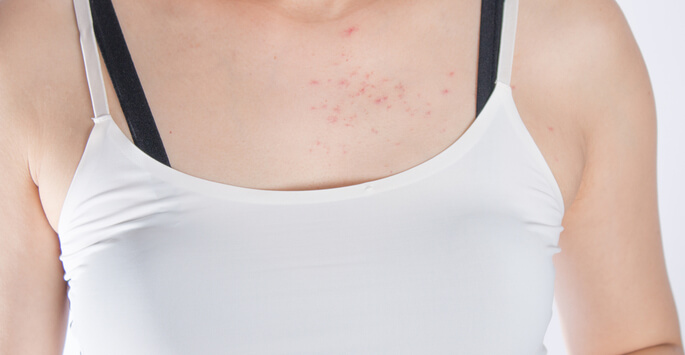An unusual condition called molluscum contagiosum might be to blame for unexplained bumps on your or your children’s skin.
This condition is pretty common, but still not well known because of its often painless symptoms and tendency to fade quickly in some people. If, however, you’re dealing with a case that is neither painless nor going away, take the time to learn more about molluscum contagiosum. We have several treatment options available at Dermatology and Skin Cancer Center, and we’ve seen many cases of this skin condition. Most often, it occurs in children, but adults can suffer from it too, particularly those with weakened immune systems.
How Can You Tell?
Unexplained bumps are the primary hallmark of molluscum contagiosum. The disease itself is a viral skin infection and causes firm, round bumps on the skin’s surface. They can vary widely in size, from as small as a pinhead to as large as a pencil eraser.
Most of the time, the bumps are painless, but if they are scratched or scraped, the infection can begin to spread across the body. Sometimes, people confuse molluscum with warts, a rash, or even chicken pox. That’s why it’s good to have a skilled dermatologist diagnose the condition, which is easy to do with an in-office exam.
Treatment Philosophy
Treatment of molluscum follows two general paths. In children, aggressive treatment can bring unwanted side effects, and often, the bumps can fade on their own, so less emphasis is sometimes placed on molluscum treatments for children. However, it’s very important to keep the virus from spreading to other uninfected areas of the body, or to other people, so precautions to avoid contagion apply to all molluscum patients.
The other path is more multi-pronged and aggressive, and aims at preventing molluscum from becoming a serious medical problem for adults and those with weak immune systems. Usually, if you have immune issues, molluscum will not disappear on its own without treatment. As always in our offices, we determine what treatment is best for each patient based on his or her overall health, age, medical history, and in the case of molluscum, where the bumps are located and the likelihood of spreading the virus.
Options for Treatment
- In this process, bumps are frozen with liquid nitrogen and removed.
- A more traditional approach is using a small blade to scrape bumps off the skin.
- Laser treatment. This is often the best for those with weak immune systems, as the bumps may be destroyed with no other skin damage to heal.
- Topical solutions. These can be applied to your skin to remove and heal bumps.
- Virus-fighting drugs. Imiquimod is one, applied to the affected area to help the immune system rid itself of molluscum. Another is retinoid or antiviral medicine applied to affected skin.
More To Know
As treatment is ongoing, it’s normal for new bumps to appear for a time. You should be aware that molluscum remains contagious until all the bumps are gone for good, however. If your immune system is healthy, you may not need treatment, but many people opt for it anyway, to get rid of the infection faster and stop it from spreading. If you have a disease that weakens or compromises your immune system, molluscum won’t go away until you get treatment for it.
Contact us anytime at Dermatology and Skin Cancer Center in Windermere, Florida if you would like a consultation or have more questions about molluscum contagiosum.

